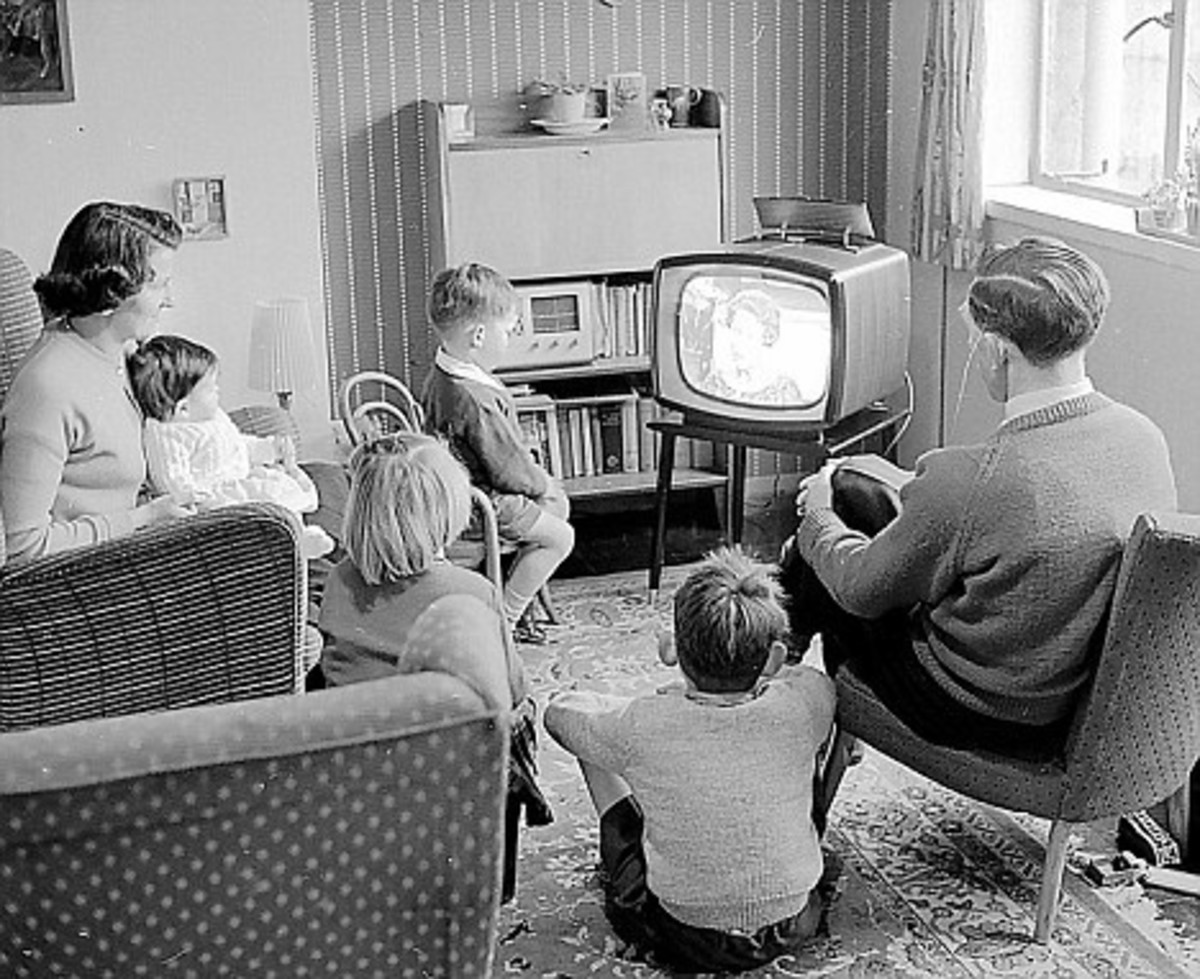The Myths of Modern American Culture
Why Much of the Younger Generation is Deluded
As a young man I used to wonder why most adults I engaged in discussion on topics of that day would usually tell me I didn't understand, but would see things differently when I was older. My attitude towards their comments would usually be that they were just old people who were no longer with the times and didn't see things the way I did. They just didn't understand that we were going to change the world to be a better place.
There is much to be said about youthful ambition. It certainly has its place in an evolving society over generations and time. What new generation has not wished that they could improve their world for the better? Is not the point of educating our children to grow into adults who are not only skilled and knowledgeable, but also have the ability to exercise common sense? Of course, but there seem to be a plethora of examples today which indicate this is not the case.
For the sake of clarity, let's put the definition of "deluded" out on the table, so the reader is not confused or unclear. Dictionary.com defines deluded as: to mislead the mind, or judgement of; deceive: His conceit deluded him into believing he was important.
What Do I Mean?
As a young boy, I recall when Elvis Presley or the Beatles were on the Ed Sullivan Show, there was a big deal made about them. There was concern about how Elvis swiveled his hips to the music. This was considered obscene in that day and the agreement had to be reached by the show that only the upper half of Elvis would be shown to the viewing audience in their homes. Later, the Beatle invasion brought about the reaction by parents of that day that these four mop headed youth just stood on the stage and screamed with the loud music.
Compared to what's evolved over the past several decades, this is laughingly innocent. In looking back though, I can't help but admit that those who said this was only the beginning of worse things to come were prophetic and insightful. If they could only see what's going on in the some sections of the music industry today, they'd be spinning in their graves.
Fast Forward
Let's take the "American Idol" phenomenon of today, for instance. Nearly every teen or twenty something today is convinced they're going to be the next American Idol singer star. Just consider the tens of thousands of youth who show up for the auditions. I can identify and understand how they desire to become famous, but where do they get this notion that all they have to do is emulate their favorite rock star, and "Bingo!" they've got it. How many of them tout and boast on camera that they're going to be the next one? Then, when they're not even given a "golden ticket", either before they leave, or they storm out the door in shock and dismay that they didn't even get accepted to Hollywood! Some don't handle this bad news too well either; spouting obsenities and explicatives that would make a longshoreman blush.
In my opinion, most of these auditioners are clearly delude as to their ability to carry a tune, let alone sing with any degree of talent. Anyone who watches these episodes can easily distinguish that those who can carry a tune AND sing with a degree of talent have a very obvious difference about them; how they interact with the judges, their self-concept, and how they react to any of the judges' critical comments about their performance. In a word, to me that difference is, maturity.
When I talk to youth who have watched the show, more often than not Simon Cowel is considered unfair, incensitive, and downright rude when he shares his evaluation with the auditioner on the show. I have thought long and carefully about why they feel this way and how it is that they react as they do. Paula Abdul, on the other hand, is clearly more sensitive and constructive in her remarks. At the risk of being misunderstood and being taken for a sexist "bigot", I would expect that from a woman because they're the more nurturing type of the two genders. Randy Jackson, in my opinion, is the more balanced of the three judges on the panel. However, I sometimes get the impression that he leans more toward the "politically correct" side of the evaluative process. But it nags at the back of my mind why it is that today's youth can't take criticism; even of a constructive nature.
Why So Sensitive?
What has the generation between mine and these youth done as parents that has fostered this inability to take criticism? If it's not the parents, then who, or what, has contributed to this way of reacting to it? Could it be the influence of today's entertainment industry? Could it be the way their parents interact with their children; if they interact to any degree of significance beyond the age of about 11 or 12? Let's face it, in today's world, the vast majority of parents are so busy trying to keep in place on the "treadmill" of the work world, most don't really spend that much quality time once their children hit puberty. Research studies are profuse that reveal this to be a fact for the larger population of parents today.
When interaction does occur at this phase in their development, it is usually of a confrontational nature. For instance, Shenikwa wants to go out on Friday night with her friends to a party and the parent is reluctant and wants more information about the circumstances. Like most adolescents, they quickly learn strategies and techniques which will get them what they want. The parent, usually struggling with their uncertainty of how to handle the fine balance between being protective and giving them an opportunity to socialize and develop friends as part of the growing process, gives in most of the time. This is, of course, assuming that the child even requests the parent's permission.
Then too, if there are any instances of interaction where parents are doing their best to nurture their child and build their self-esteem, the trend seems to be that they overdo it, or exaggerate it to the point of obsurdity. Take the soccer or little league field experience as an example. I've talked to several friends and acquaintences who've shared with me that as a coach they've seen an increase from parents watching the match of pushing the concept to their child that they're a fantastic athlete, even though the kid can't even kick or hit the ball. Then there's the extreme cases we hear about where the parents get so wrapped up in the way the game is being refereed, or called, that it turns into brawls or fights between the parents and the umpires or coaches. This clearly isn't sending the proper message children need to learn about how to deal with undesirable situations in life, whether it's that they aren't doing well in a sport, or how to handle a situation they don't agree with. In my opinion, this is one type of example which sets the attitude for how they'll handle anyone who is not "syrupy sweet" and "sensitive" toward them, because they're used to it and expect it.
I'm convinced, based on what I see on television today, with all of the hundreds of choices for shows we have, that it is contributory to a large extent in the formation of attitude and thinking about how to act, or react. I'm fully aware of the fact that the industry is in business to make money and they have to cater to the demographics they're targeting, but the real problem with this whole issue is that much of what pre-adolescent and adolescent youth are watching is either not controlled by the parent adequately, or is more often today viewed without the parent being aware because they are either not home, or the child has a television of their own in their room and they aren't exercising their parental perrogative about what they watch. In my opinion, this is a combination of affluence and materialism run amuck! How did that television get in the child's room where it can't be monitored? It didn't suddenly appear there.
The type of content on many shows today, compared to what I wathed 30 years ago, is appauling and indecent, to be modest. Yet, because the youth of today have not known anything different, they believe it's totally normal and acceptable. To express one's disgust about the contents of some shows they prefer to watch brings reactions and remarks which are disrespectful, indignant and defiant toward whoever is expressing a difference of view about what they watch. The vulgarity, portrayal of the "father figure" in a household, the discourteous behavior, the cheating, lying, and sordid array of other less than virtuous modeling going on, is for someone my age now, a sad statement about how low our culture has debased itself over the last several decades. It should be noted here that I'm not even touching on the rise in drug problems and S.T.D.s plaguing our youth today. I'm sure you know the story better than I.
To me, this is a clear indication that the past couple of generations have come to develop an attitude of utter disrespect and contempt for anyone who is even attempting to counsel them for their own sake. It saddens me.
The "Life is Fair" Myth
Another prevalent myth held by most youth today is one that perpetuates a false premise that life should be "fair". This myth is supported by the trend of claiming "victim" status to explain why someone hasn't been successful in their life; blame it on someone else or anything else but themselves seems to be in vogue today. This is a very dangerous and incideous notion which is stripping our youth of any initiative to get ahead in the world by taking responsibility for their future.
Since when did anyone ever guarantee me or you that life would be fair? Is it fair that my next older brother was shot and killed by a 17 year old trying to sell drugs? Is it fair that my brother's assailant has already served his sentence and gets to live his life, while my brother can not? Is it fair that I grew up with learning difficulties and struggled with certain subjects? No, it's not. But I wasn't allowed to whine and moan about it. I at least had a mother who taught me that to accept "victim" status, and blame everyone else but myself, is not going to solve the issue.
When I was a new fourth grader on the first day of school my mother was with me when I met my new teacher. In looking back on this incident, I suspect that she realized even at my early age, I was getting a bit out of control. After introductions and some small talk, my mother said to the teacher, "Mr. Jones, I want you to know that if he ever is disrespectful or defiant to you, you have my permission and support to smack him across the face. All I ask is that you call me at home to let me know what happened, and I'll take care of the rest there." At the time, I didn't believe her, but a few months later, I wasn't very kind in my repsonse to my teacher. He smacked me, reminded me of what my mother told him, and when I got home, I was grounded for the weekend. I never misbehaved or disrespected my teachers again. Now, you and I know that, in today's social climate in schools, if a teacher did that, they'd be fired from their position in a minute.
I learned that I had to work at overcoming my difficulties, get over it, and not accept the notion that anyone could hold me back from achieving what I wanted to accomplish and get out of life. I was responsible for my success, not someone else. She was right! I've gone on to accomplish many things in life, including a masters degree and a career that allowed me to own a house in a nice neighborhood; something my parents never managed to achieve. I just wish my dad had lived long enough to learn this. I know he would have been pleased and proud. I'm also a proud parent of two daughters; one college age, and the other working her butt off to get ahead. I'm certain she will. I believe it was all because I was not caudled, or allowed to accept the negative attitude that it was someone else's fault I had problems and I'm grateful I've passed this on to my children.
Full Circle
Thus, we have come full circle; the youth of today don't understand their elders and their elders are trying to tell them they'll understand better when they grow up. When they do, will the pattern continue to repeat itself? It appears to be so. It seems though, to be in an ever declining one. I hope I'm wrong about this.
Perhaps I will never know why it seems to me that common sense has gone the way of the Dodo bird; extinct for all intents and purposes. I suspect it is a victim of "political correctness", another social plague paralizing or cohercing us into silence today; afraid of speaking our views for fear of reprisals.
However, to be balanced about this topic, there is the reality that there are many good, well rounded, responsible, caring, and ambitious youth who, like those in the past, are replacing the older generations who have left us and are applying themselves to the opportunities before them. They are the "salt of the earth" and help balance and maintain civility, such as it is today.
Unfortunately, it appears that we are like the frog that's been put into a pot of cool water on a stove with a flame under it. As the water gradually warms up, the frog become accustomed to the change in temperature because it's increasing slowly, until finally the frog is cooked and dead. I often wonder if this cycle will ever be broken or altered. And, if it is, what will it take?
Other hubs by Jondolar
- Critical Thinking and Diversity Under Siege
Universities and colleges were established as institutions of higher learning where young adults were challenged to think critically amidst a diverse population. Yet today, such divergent thought is supressed and even punished. How has this happened? - The Morphing of America
Why has our nation changed from one of individualism, minimal govt. intervention, a growing economy and opportunity, to one where collectivism dominates, govt. intervention is growing and opportunities are increasingly more scare? - Global Warming Vs. Global Cooling
Al Gore is championing global cooling and charging carbon credits. Will this make the difference hoped for? On the other side of the coin, there's a large group of scientists who disagree. Some evidence indicates cooling is occurring. Who to believe! - Jondolar's Boston Marathon Experience
One of his early accomplishments was qualifying and competing in the Boston Marathon the same year Bill Rogers won it. For the distance runner looking for inspiration and motivation to go for it, this is one you don't want to miss reading. - Jondolar's Experience of Summiting Mt. Rainier
Join Jondolar and the team as they climb to the top and back down what is considered the most difficult and dangerous mountain to climb in the lower 48 states of the U.S. Pictures accompany this event for the reader' more complete experience. - Jondolar's Backpacking Experience on the PCT in '01
Jondolar and Bill cover 76 miles of the Pacific Crest Trail in California's Sierra Nevada mountains through one of the most beautiful sections. Pictures, taken by his hiking buddy, Bill Sharpsteen, provide visual enhancement for the reader. Enjoy! - Jondolar's Crater Lake Backpack Trek in '05
Once again, Jondolar and Bill cover a 76 mile section of the Pacific Crest Trail through some of the most beautiful wilderness of southern Oregon in five days. Beautiful pictures, taken by hiking buddy Bill Sharpsteen, are provided for the reader. - The 800 MPH Challenge - Breaking the World Land Speed Record
Jondolar's account of the 10 year long project to build, test and land a sponsorship to bring the land speed record back to North America. With the Brits setting it at 763 MPH 10 years ago, the team is confident it can be done, but not without $$$$.








